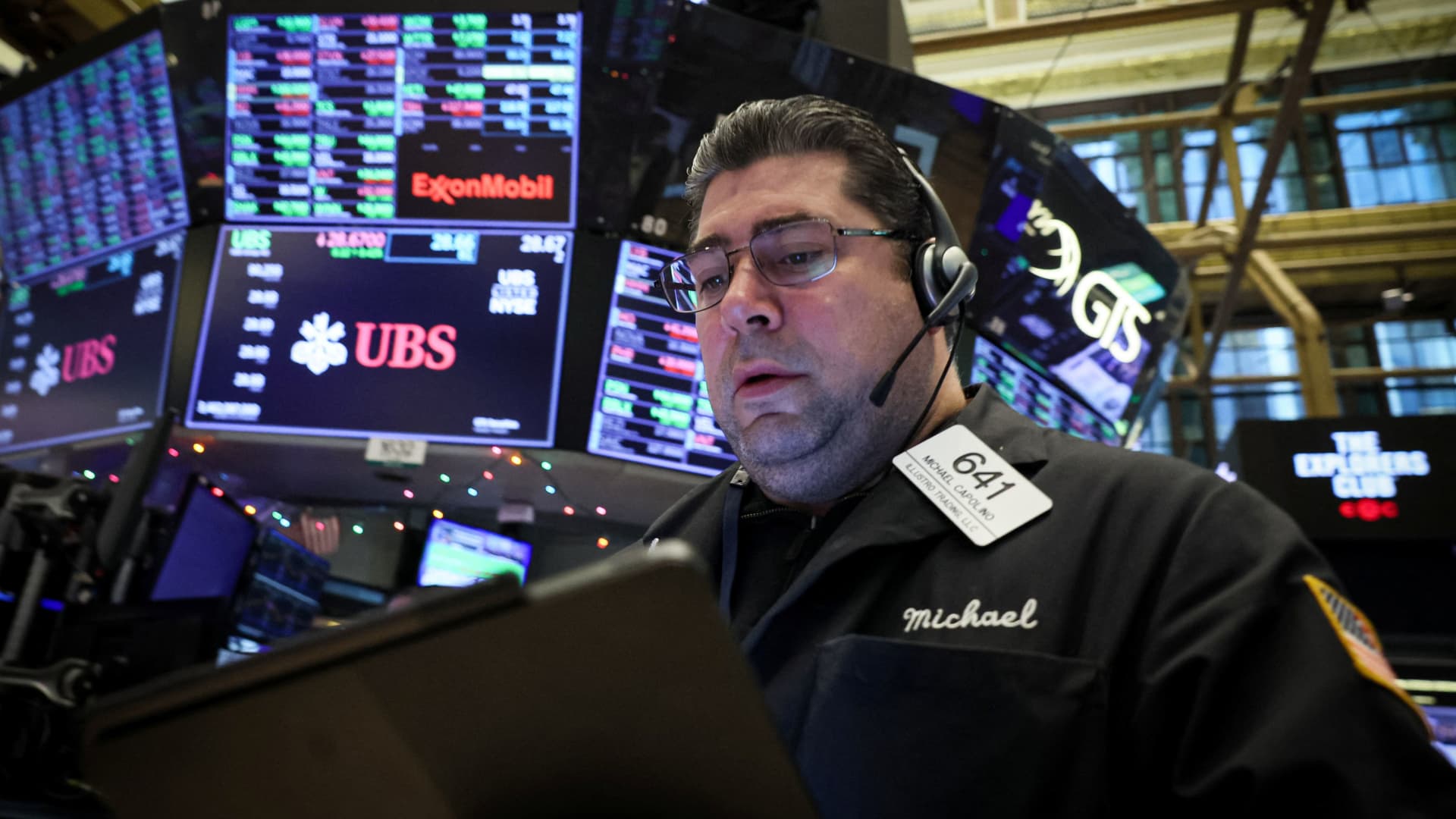@Scintillating10 No wonder the Dow fell 470 points. You sold some of your billions.I did some profit taking this morning, pre-market. I sold a bunch of shares. I figure they be lower sometime early 2024. Can get back in if I want
OT: Lets talk about stocks (Part 3)
- Thread starter Lshap
- Start date
You are using an out of date browser. It may not display this or other websites correctly.
You should upgrade or use an alternative browser.
You should upgrade or use an alternative browser.
- Status
- Not open for further replies.
Quatre Vingt Treize
Registered User
No, $30,000 is all for me. But millions around the world just like me. Did same thing.@Scintillating10 No wonder the Dow fell 470 points. You sold some of your billions.
- Jun 24, 2012
- 84,053
- 166,232
I’m thinking of going in with ETF investments rather than individual stocks and doing DCA. I’ll concurrently invest similar amounts in mutual funds with a financial advisor and then compare the net outcome after fees over say one year. I want to find out if I can beat the advisor using ETFs alone.No, $30,000 is all for me. But millions around the world just like me. Did same thing.
What positions did you end up selling off, if I may ask?
Habs
60% of the time I’m right every time
- Feb 28, 2002
- 21,576
- 21,318

Dow closes more than 470 points lower Wednesday to snap 9-day win streak: Live updates
Investors cashed in some profits following the market's recent hot streak.www.cnbc.com
@Habs We're both smart. Fortunately, I put half my portfolio in bonds at 10:35 before the market fell.
Give it a year and a half brotha!
Quatre Vingt Treize
Registered User
I sold a bunch of value stocks. A mix of bank, railroad, Emera. I bought low earlier in year, took the profit.I’m thinking of going in with ETF investments rather than individual stocks and doing DCA. I’ll concurrently invest similar amounts in mutual funds with a financial advisor and then compare the net outcome after fees over say one year. I want to find out if I can beat the advisor using ETFs alone.
What positions did you end up selling off, if I may ask?
My portfolio is mainly value stocks, banks, railroads, utilities, 80-90%, it varies year to year. I invest the rest, 10-20% in next hot thing. I was in Tesla for the big years. Bitcoin for about 6 months. Apple when first iPhone came out. Up until Steve Jobs died. I sold out which was mistake. Microsoft when desktop computers first came about. Presently I hold some AI. I like to invest what I just sold into quantum computing.
This post isn't as interesting as @Scintillating10 's, but I put almost half in the total stock market, almost half in bonds, and a little bit in undervalued stocks with reliable dividends.

Dow closes higher by more than 300 points, S&P 500 rebounds from worst day since September: Live updates
Stocks rose, resuming their upward march following a losing day on Wall Street.
Quatre Vingt Treize
Registered User
Chapter 8 of Benjamin Graham’s book “The Intelligent Investor” is titled “The Investor and Market Fluctuations”. In this chapter, Graham discusses how an investor can handle market fluctuations in a way that limits their emotional exposure while positioning them for long-term gains. He mentions that swings in the market may be as high as 50% increases from an issue’s lowest price and 33% decreases of the issue’s highest price. Graham advises investors to be comfortable with the fact that the market will swing over the course of time and to capitalize on these fluctuations. He suggests two ways to do so: timing and pricing. The first involves anticipating the action of the stock market and buying or holding when the future seems promising, and selling or refraining from buying when the future looks bleak. However, Graham warns that by trying to time the market, the investor is very likely to become a speculator, therefore reaping the results of a speculator as well. The second way is to take advantage of buying after each major decline, and selling after each major advance. Graham reminds us that even if one trend seems to be a “new-wave” of the market, it is likely to end.
In summary, Chapter 8 of “The Intelligent Investor” provides insights into how an investor can handle market fluctuations in a way that limits their emotional exposure while positioning them for long-term gains.
In summary, Chapter 8 of “The Intelligent Investor” provides insights into how an investor can handle market fluctuations in a way that limits their emotional exposure while positioning them for long-term gains.
Chapter 8 of Benjamin Graham’s book “The Intelligent Investor” is titled “The Investor and Market Fluctuations”. In this chapter, Graham discusses how an investor can handle market fluctuations in a way that limits their emotional exposure while positioning them for long-term gains. He mentions that swings in the market may be as high as 50% increases from an issue’s lowest price and 33% decreases of the issue’s highest price. Graham advises investors to be comfortable with the fact that the market will swing over the course of time and to capitalize on these fluctuations. He suggests two ways to do so: timing and pricing. The first involves anticipating the action of the stock market and buying or holding when the future seems promising, and selling or refraining from buying when the future looks bleak. However, Graham warns that by trying to time the market, the investor is very likely to become a speculator, therefore reaping the results of a speculator as well. The second way is to take advantage of buying after each major decline, and selling after each major advance. Graham reminds us that even if one trend seems to be a “new-wave” of the market, it is likely to end.
In summary, Chapter 8 of “The Intelligent Investor” provides insights into how an investor can handle market fluctuations in a way that limits their emotional exposure while positioning them for long-term gains.
Warren Buffett, a Graham student, warns against market timing and recommends holding for the long term.
You pick what you should do.
- Jun 24, 2012
- 84,053
- 166,232
It’s all about that time-honored axiom — it’s not about timing the market, but about time in the market.Warren Buffett, a Graham student, warns against market timing and recommends holding for the long term.
You pick what you should do.
Quatre Vingt Treize
Registered User
When something bad happens, like a war breaking out, the market will take a pounding. But it won't last. He said it could drop as much as a third. But will rise again about 50% more than what it was.Warren Buffett, a Graham student, warns against market timing and recommends holding for the long term.
You pick what you should do.
Hope Of Glory
Registered User
When something bad happens, like a war breaking out, the market will take a pounding. But it won't last. He said it could drop as much as a third. But will rise again about 50% more than what it was.
Yeah, the only "timing" I find is acceptable is if you buy a little bit (or maybe even a lot) more after the market drops. Otherwise you keep the regular investment over time. Trying to time the top is a dangerous endeavour.
Agreed. Buying after a drop, DCA, and holding are the only strategies that work. Except for buying after a drop, you can't time the market. Once you realize that, you will be successful.Yeah, the only "timing" I find is acceptable is if you buy a little bit (or maybe even a lot) more after the market drops. Otherwise you keep the regular investment over time. Trying to time the top is a dangerous endeavour.
Quatre Vingt Treize
Registered User
Chapter 20 of Benjamin Graham’s book “The Intelligent Investor” is titled “The Margin of Safety as the Central Concept of Investment”. In this chapter, Graham revisits the core of the text which is the “Margin of Safety”. The Margin of Safety is the single-most important concept that Graham speaks about throughout the book and is at the heart of the Value Investing Philosophy. Graham explains that the Margin of Safety is the difference between the intrinsic value of a stock and its market price. He emphasizes that investors should only buy stocks when they are priced substantially below their intrinsic value. Graham also highlights the importance of achieving a margin of safety in investing. He advises investors to be patient and disciplined in the face of market fluctuations. Graham reminds us that even if one trend seems to be a “new-wave” of the market, it is likely to end.
In summary, Chapter 20 of “The Intelligent Investor” provides insights into the importance of the Margin of Safety as the central concept of investment. Graham emphasizes that investors should only buy stocks when they are priced substantially below their intrinsic value and highlights the importance of achieving a margin of safety in investing. He also reminds us to be patient and disciplined in the face of market fluctuations.
In summary, Chapter 20 of “The Intelligent Investor” provides insights into the importance of the Margin of Safety as the central concept of investment. Graham emphasizes that investors should only buy stocks when they are priced substantially below their intrinsic value and highlights the importance of achieving a margin of safety in investing. He also reminds us to be patient and disciplined in the face of market fluctuations.
WinterLion
Registered User
- Oct 1, 2017
- 5,302
- 5,742
ETFs vs. Mutual Fund investing — does he have a point:
This guy most definitely has a point. Fees eat away at potential profits. I think if you want to invest on your own a "couch potato" strategy is great if you want to keep things simple. Keep the MER low and ride the market and readjust. The ETF market has now got many more great options to choose from and even ones that do the balancing for you. It's extremely popular and easy with the discount brokerages. The hard part is not getting lost in a maze of opinions and emotions when you invest on your own... so try to keep it simple. Maybe find a good book intead of getting steered in all directions by researching on the internet. Most strategies are not that different in the end.
WinterLion
Registered User
- Oct 1, 2017
- 5,302
- 5,742
How do you know when the drop is done dropping?Yeah, the only "timing" I find is acceptable is if you buy a little bit (or maybe even a lot) more after the market drops. Otherwise you keep the regular investment over time. Trying to time the top is a dangerous endeavour.
SOLR
Registered User
Let's talk about stocks, baby
Let's talk about intel and apple
Let's talk about all the good things
And the bad things that may be
Let's talk about stocks
Let's talk about stocks for now
To the people at home or in the crowd
It keeps coming up anyhow
Don't decoy, avoid, or make void the topic
Cuz that ain't gonna stop it
Now we talk about stocks on the radio and video shows
Many will know anything goes
Let's tell it like it is, and how it could be
How it was, and of course, how it should be
Let's talk about intel and apple
Let's talk about all the good things
And the bad things that may be
Let's talk about stocks
Let's talk about stocks for now
To the people at home or in the crowd
It keeps coming up anyhow
Don't decoy, avoid, or make void the topic
Cuz that ain't gonna stop it
Now we talk about stocks on the radio and video shows
Many will know anything goes
Let's tell it like it is, and how it could be
How it was, and of course, how it should be
Habs
60% of the time I’m right every time
- Feb 28, 2002
- 21,576
- 21,318
ETFs vs. Mutual Fund investing — does he have a point:
they both serve a purpose, ETF's open up a whole new world, Mutual Funds aren't going anywhere with the big institutions. Crypto and ETF's may be something special for example.
Quatre Vingt Treize
Registered User
Just buy a major value stock. Something like a Roal Bank, Should average 15% return annually. With the dividend includedThis guy most definitely has a point. Fees eat away at potential profits. I think if you want to invest on your own a "couch potato" strategy is great if you want to keep things simple. Keep the MER low and ride the market and readjust. The ETF market has now got many more great options to choose from and even ones that do the balancing for you. It's extremely popular and easy with the discount brokerages. The hard part is not getting lost in a maze of opinions and emotions when you invest on your own... so try to keep it simple. Maybe find a good book intead of getting steered in all directions by researching on the internet. Most strategies are not that different in the end.
QuebecPride
Registered User
ETFs vs. Mutual Fund investing — does he have a point:

ETF Portfolios - Canadian Couch Potato | Canadian Couch Potato
These all in one ETF portfolios by Canadian Couch Potato are the best solution for the vast majority of DIY investors. Learn more.
canadiancouchpotato.com
Mutual funds are more expensive than ETFs generally in terms of MERs, and are usually 'active' funds, so they try to beat the indices (S&P500, TSX, NASDAQ, etc.). They return less than indices 80% of the time, so most people are better off going through plain vanilla index ETFs. Unfortunately, when you're a DIY, you don't get as much service from financial institutions as if you invest in their in-house products.
If you have less than a 100K, ETFs or Mutual funds it doesn't really matter, the biggest change in value you'll get is from your contributions, but once you get to more than 100K, you can probably go and take a look at options.
Most people should just follow the canadian couch potato way and let it ride the wave.
QuebecPride
Registered User
15% a year is asking a lot for a bank stock lol. It returned 43% gross the past 5 years and the market is at all time highs.Just buy a major value stock. Something like a Roal Bank, Should average 15% return annually. With the dividend included
Jaynki
Registered User
- Feb 3, 2014
- 5,056
- 6,054
Christ, did not know we had a stocks thread here.
On watch for a buy -> DUOL.
Recent IPO ARM is looking good here too, might punch for all time high when he will get out of its short term consolidation.
ACLX consolidating tightly in ATH (~14% from recent high to recent low.) Another week in those parameter and the next leg up might be explosive.
Dang, my stocks calls are even better than my hockey calls
Quatre Vingt Treize
Registered User
I've held Royal Bank since about 1984. It was like $3 a share back then. $133 now.15% a year is asking a lot for a bank stock lol. It returned 43% gross the past 5 years and the market is at all time highs.
About 10% return+ 4.5% yield you will get. Double my money about every 5 years. Averaged out over long term. I've never had a Mutual Fund come close to that.
- Jun 24, 2012
- 84,053
- 166,232
I’m getting into the market more regularly starting in January using a DCA approach and mostly focusing on ETFs / some mutual funds.15% a year is asking a lot for a bank stock lol. It returned 43% gross the past 5 years and the market is at all time highs.
I’d also like to add a couple of individual stocks that I could hold for the year or longer. Any feedback on what those of you in this thread are doing, would be appreciated as I’ll do my own research but am only looking for a few targets if anyone cares to share. Thx in advance.
Any feedback on from
How has the Royal compared with other Canadian bank stocks — has it outperformed them say in the last 5 years?I've held Royal Bank since about 1984. It was like $3 a share back then. $133 now.
About 10% return+ 4.5% yield you will get. Double my money about every 5 years. Averaged out over long term. I've never had a Mutual Fund come close to that.
- Status
- Not open for further replies.
Users who are viewing this thread
Total: 3 (members: 0, guests: 3)
Latest posts
-
GDT: 2024-25 season WCQF LA Kings vs Edmonton Oilers game 6 @7:00pm 5/1/25 Oilers lead 3-2 (202 Viewers)
- Latest: Nasti
-
-
-


